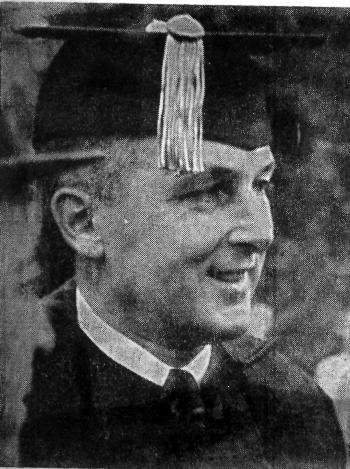
News
Summers Will Not Finish Semester of Teaching as Harvard Investigates Epstein Ties

News
Harvard College Students Report Favoring Divestment from Israel in HUA Survey

News
‘He Should Resign’: Harvard Undergrads Take Hard Line Against Summers Over Epstein Scandal

News
Harvard To Launch New Investigation Into Epstein’s Ties to Summers, Other University Affiliates

News
Harvard Students To Vote on Divestment From Israel in Inaugural HUA Election Survey
Eighteen Years: Milestones of a Presidency

June 1, 1953, 12:30 p.m.: The Harvard Corporation announces Pusey’s presidency to the largest gathering of newspeople since the Tercentenary.
Oct. 13, 1953: Pusey is vested with the powers and privileges of the presidency in the Faculty Room of University Hall, before two hundred guests.
1953: Pusey calls the first large-scale press conference ever held in Massachusetts Hall for “freedom of inquiry” in response to McCarthy’s accusations that Harvard students are “open to indoctrination by communist professors.”
1953: Pusey invites William Bentinck-Smith ’37 to become his assistant. Bentinck-Smith remains in this position for 17 years.
1954: Pusey expresses pessimism for the state of the nation in his Baccalaureate speech, saying, “Our national life has been suffering from a peculiarly violent, festering mental ill-health. . .”
April 25, 1956: Pusey sketches out $40 million construction program at a meeting of the Associated Harvard Clubs in Miami.
1956: At a meeting in Pulpit Harbor, Maine, Pusey says $125 million is needed for the university.
Jan. 20, 1957: In a report to the Board of Overseers, Pusey urges the raising of academic standards. “The standard has been too low,” he says.
1957: Pusey announces a two-year fundraising program for the college. The governing boards give $13 million as catalyst for the campaign.
1957: Pusey tells a Jewish couple they cannot be married by a rabbi in Memorial Church, inciting much controversy.
Dec. 31, 1959: The two-year campaign passes the $80 million mark. By the end of the campaign, $100 million had been raised, providing the funds for the construction of buildings such as Quincy House, Leverett Towers, Mather House, and the Loeb Drama Center.
1961: McGeorge Bundy, dean of the Faculty, joins Kennedy administration. Pusey takes over as interim Dean of Arts and Sciences.
June 10, 1962: Pusey gives Baccalaureate address on the importance of “moral education.”
May 27, 1963: Pusey announces he will serve as acting Dean of the Graduate School of Education until he finds a successor to U.S. Commissioner of Education Francis Keppel ’38
1963: Pusey reports on the University’s growth during his first ten years in office. He cites an increase in student enrollment from 11,400 to 13,700, the construction of 100 buildings and an $845 million endowment.
1965: In his Baccalaureate address, Pusey notes “a new and rather disturbing seriousness of tone” in the anti-war demonstrations.
1966: Two hundred demonstrators stage an on-campus seven hourblockade of a recruiter at the Dow Chemical Company, principal supplier of napalm to the U.S. military. Pusey condemns actions of students and puts 74 on probation.
1968: In his January annual report, Pusey calls antiwar protestors “a small group of over-eager young in evidence on many campuses who feel they have a special calling to redeem society.”
1969: Pusey meets with the Student-Faculty Council in March about the ROTC. He supports it because “students will want to satisfy their military obligations this way.”
April 9, 1969: Two to three hundred students occupy University Hall’s Faculty Room to protest the ROTC presence on the Harvard campus. At 8 p.m. Pusey says the protestors’ allegations had “no basis in fact.”
April 11, 1969, 5:00 a.m.: Pusey summons 200 state troopers who violently remove the protestors from University Hall. Students boycott classes.
April 22, 1969: Faculty votes to give students a role in creating and running academic departments. Student strike ends.
1969: Thirty seniors walk out of Commencement in protest.
1969: Pusey issues a statement in October against the Vietnam War.
1970: In February, Pusey announces he will retire the following year.
1970: Pusey gives students academic latitude to protest and be politically involved.
January 11, 1971, Derek Curtis Bok is elected as Pusey’s successor.
January 17, 1971: Pusey authors a 21-page annual report, writing that the “advances made [from 1969-1971] were little short of remarkable in both number and quality in view of the almost continuous disruption or threat of disruption.”
1971: University names underground library after Pusey.
—CLAIRE A. PASTERNACK
Want to keep up with breaking news? Subscribe to our email newsletter.
